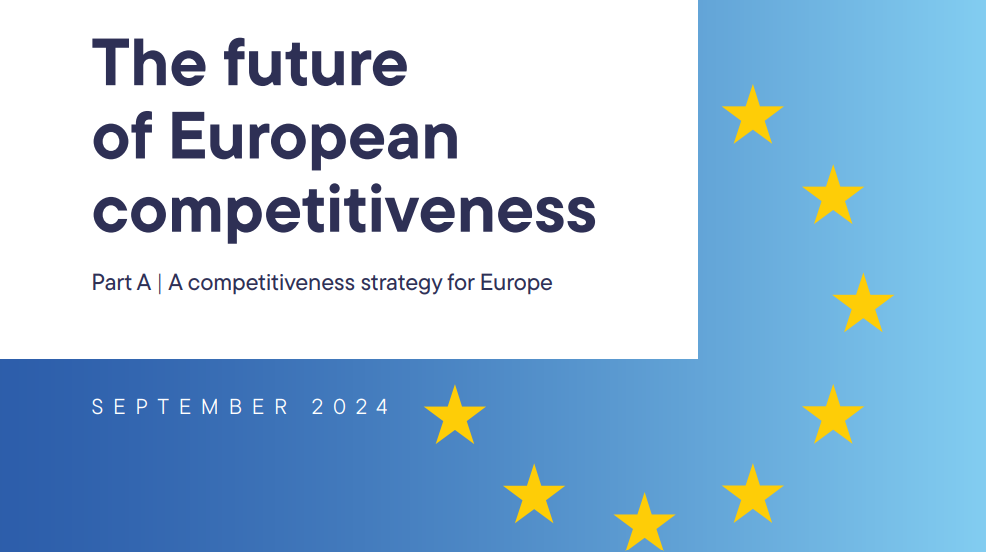Geopolitics is here to stay and the state is back: An analysis of the Draghi report
As we navigate the complexities of the global economy, it has become increasingly clear that traditional paradigms are no longer sufficient. The recent report by Mario Draghi on European competitiveness underscores a critical shift: power relations now significantly influence economic ties, and the state has emerged as a central player in this new landscape.
The New Reality: Power Dynamics Over Economic Principles
In today's world, economic competitiveness is no longer solely determined by market forces. Instead, geopolitical power dynamics are reshaping the rules of the game. Draghi's report, praised for its clarity and lack of euphemisms, highlights how Europe's lagging growth and productivity, particularly in comparison to the United States and China, are not just economic issues but also reflect broader strategic challenges.
The Rise of State Intervention
The state's role in economic policy is becoming more pivotal whether we like it or not. Draghi's report advocates for a comprehensive industrial strategy, emphasizing the need for coordinated state action to finance and implement policies that drive innovation, digital transformation, and green initiatives. This includes proposals for common EU debt instruments to fund joint investment projects, which would enhance the EU's competitiveness and security.
Why Classical Economic Solutions No Longer Suffice
The traditional mantra of deregulation and minimal state intervention is no longer effective in a world where other major players, like China and the United States, are actively leveraging state power to drive their economic agendas. China's state-backed competition, for instance, poses a significant threat to Europe's clean-tech and automotive industries, necessitating a more proactive and coordinated state response. The same holds for Biden's cleantech policies, which are based on massive subsidies to domestic producers.
Europe's Path Forward
For Europe to remain competitive, it must adopt a more strategic and interventionist approach. Key takeaways from Draghi's report include:
Innovation and Commercialization: Europe must close the innovation gap with the US and China, particularly in advanced technologies. The problem is not a lack of ideas or ambition but rather the failure to translate innovation into commercialization. This requires addressing issues such as late-stage VC funding, market fragmentation, and complex regulation. This means more EU and fewer national regulations, creating a large enough market for European tech firms to remain in Europe.
Decarbonisation and Competitiveness: Draghi advocates for a marriage between decarbonisation and competitiveness, reducing the EU's energy cost disadvantage by investing in grid connectors, renewables, and reducing energy taxes. However, this must be balanced with protecting the EU's green industry and standing up to China where necessary.
Sectoral Strategies: The EU should implement carefully calibrated sectoral strategies in trade and industrial policies, distinguishing between areas where the EU has lost competitive advantage, employment-rich sectors, security-relevant sectors, and infant industries.
Security and Dependencies: The EU must increase security and reduce dependencies by pursuing access to critical raw materials, digital services, and common spending on the defense industry. This collaboration will lower the 'insurance cost' for EU countries.
A Call for Action and CoordinationDraghi's report is a plea for the EU to develop a genuine industrial strategy, one that is backed by a clear plan and strategic direction. It emphasizes the need for member states to agree on what they want and how to achieve it, rather than relying on fragmented and ineffective policies. The report proposes significant investments, estimated at €750-800 billion annually, to close the innovation gap and enhance competitiveness.
Key Challenges and Proposals
Funding and Governance: The report outlines the need for substantial investment and reform of the EU budget, which may face resistance from frugal nations like Germany. Draghi's call for common debt to unlock a truly integrated European capital market is a contentious issue.
Policy Coordination: Draghi advocates for closer coordination of policies to speed up decision-making, reduce overregulation, and equip the EU with a genuine foreign economic policy. However, the effectiveness of soft coordination through the competitiveness council is questionable.
Innovation and Resilience: The report suggests rethinking competition policy to include innovation and resilience as key considerations for regulators. This would help create a more integrated EU market for tech firms to scale quickly.
Conclusion
In this new era, where power relations dictate economic outcomes, Europe must adapt by strengthening the role of the state in economic policy. By embracing a more proactive and coordinated approach, Europe can ensure its competitiveness and prosperity in a rapidly changing global landscape. The time for classical economic solutions is behind us; it is time for a new, state-led strategy that acknowledges the realities of today's geopolitical economy. Draghi's report presents a compelling case for why Europe needs a real plan and strategy. It is now up to EU leaders, particularly France and Germany, to choose between building a real growth agenda or facing "slow agony."
But given the current preoccupations in Berlin and Paris with domestic political trouble finding agreement on such a big overhaul of EU policies will be especially hard now.
For my Dutch-speaking readers: If you want to better understand how geopolitics is now driving economic relations, read my book 'Markt Onder Vuur': Belgium - Netherlands.



